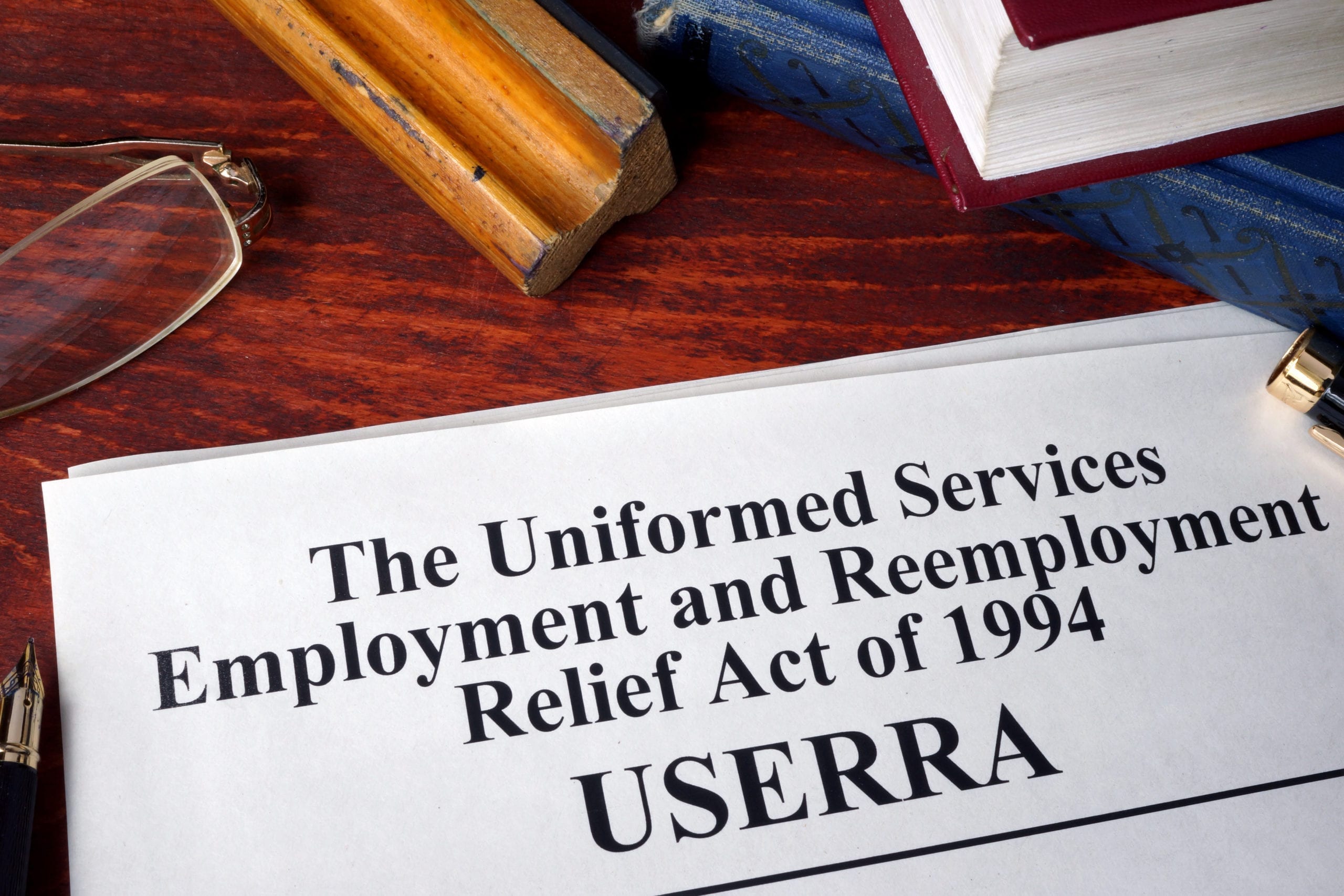Brian J Graber LLC is a USERRA lawyer representing employees in Illinois, Indiana, and Michigan who suffer discrimination, harassment, or retaliation because of their military status. The Uniformed Services Employment and Reemployment Rights Act of 1994 (USERRA), 38 U.S.C. §4301, et seq., and the Illinois Human Rights Act, (IHRA), 775 ILCS 5/2-102(A) both provide protections to past and present members of the uniformed services from employment discrimination, harassment and/or retaliation on the basis of their military service or military service obligations. These laws protect against military service discrimination. USERRA also protects the reemployment rights of members of the military who are absent from their civilian employment to serve in the U.S. military. There are certain advantages and disadvantages to USERRA and IHRA in the employment discrimination context that need to be considered in claims against private, State, or local municipal employers. The information provided below focuses on the rights of military members against private, State, and municipal employers for employment discrimination, harassment, and retaliation. Illinois military employees have broad protections from employment discrimination and retaliation under the Illinois Service Member Employment and Reemployment Act, (ISERRA), and the Illinois Human Rights Act. Click here to learn more about ISERRA protections from employment discrimination and retaliation.

THE REMEDIES UNDER THE IHRA FOR EMPLOYMENT DISCRIMINATION AND RETALIATION CLAIMS AGAINST PRIVATE OR STATE EMPLOYERS ARE BROADER THAN THE REMEDIES PROVIDED BY USERRA BUT THERE ARE ADDITIONAL REQUIREMENTS TO BRINGING A CLAIM UNDER THE IHRA.
A past or present member of the military facing employment discrimination, harassment, or retaliation because of his/her military service can bring claims under both USERRA and the IHRA to maximize the available damages. USERRA, 38 U.S.C. §4302(a) does not supersede, nullify, or diminish any Illinois law that establishes a right or benefit that is more beneficial to service members. The remedies available under the IHRA, 775 ILCS 5/8A-104 are far more superior than the remedies available under USERRA, 38 U.S.C. §4323(d). Under the IHRA, a successful service member is entitled to un-capped compensatory damages and injunctive relief.
I. IHRA HAS A 300 DAY STATUTE OF LIMITATIONS REQUIRING THE FILING OF A CHARGE OF DISCRIMINATION WITH THE ILLINOIS DEPARTMENT OF HUMAN RIGHTS.
Most statutes limit the time frame an aggrieved employee or applicant has to file a claim in court or with an administrative agency to enforce their rights. Failure to timely bring a claim within the proper time frame results in the employee or applicant being barred from ever enforcing any rights under the particular statute. The IHRA, 775 ILCS 5/7A-102(A)(1) has a statute of limitations requiring an aggrieved military service member to file a Charge of Discrimination with the Illinois Department of Human Rights 300 calendar days after the date that a civil rights violation allegedly has been committed. USERRA, 38 U.S.C. §4327(b) has no statute of limitations. USERRA is unique because it does not have any statute of limitations. USERRA does not require any pre-lawsuit administrative filing requirements for employment discrimination claims brought against private or State employers similar to the IHRA.
II. IHRA ONLY APPLIES TO PRIVATE EMPLOYERS WITH 15 OR MORE EMPLOYEES FOR ANY CLAIMS ACCRUING BEFORE JULY 1, 2020.
The IHRA, 775 ILCS 5/2-101(B)(1)(a) only applies to private employers employing 15 or more employees within Illinois during 20 or more calendar weeks within a calendar year of or preceding the alleged violation. This means that a private employer must have at least 15 or more employees in order to have coverage under the IHRA for any claims accruing before July 1, 2020, for military status discrimination or harassment. Currently, an Illinois employer with less than 15 employees in Illinois can be held liable under the IHRA, 775 ILCS 5/6-101 for retaliation against an employee based on his or her military status.
Illinois has amended the IHRA, 775 ILCS 5/2-101(B)(1)(a) effective on and after July 1, 2020, imposing liability on any Illinois employer employing one or more employees within Illinois during 20 or more calendar weeks within the calendar year of or proceeding the alleged violations. This means that any employer employing one or more employees in Illinois on and after July 1, 2020, can be held liable under the IHRA for military status discrimination and harassment.
III. THE IHRA DOES PROVIDE A 60 DAY OPT-OUT PROVISION.
The IHRA, 775 ILCS 5/7A-102(C-1) allows a military service member to opt out of the Illinois Department of Human Rights (IDHR) investigation of the Charge of Discrimination within 60 days of receipt of the notice of the rights to opt-out. If the option to opt-out of the IDHR’s investigation is authorized, the military service member will get a Notice from the Director allowing the military service member to commence a lawsuit in a court of competent jurisdiction within 90 after receipt of the Notice.

EMPLOYMENT DISCRIMINATION BECAUSE OF MILITARY STATUS UNDER THE IHRA
The IHRA, 775 ILCS 5/1-103(J-1) defines “military status” as a person’s status on active duty in or status as a veteran of the armed forces of the United States, status as a current member or veteran of any reserve component of the armed forces of the United States, including the United States Army Reserve, United States Marine Corps Reserve, United States Navy Reserve, United States Airforce Reserve, and the United States Coast Guard Reserve, or status as a current member or veteran of the Illinois Army National Guard or Illinois Air National Guard. Under 775 ILCS 5/1-103(Q) “Unlawful discrimination” means discrimination against a person because of his or her military status.
Effective January 1, 2020, the Illinois legislature amended the discrimination provisions of the IHRA, 775 ILCS 5/2-101(E-1) to include harassment and have defined “harassment” as any unwelcome conduct on the basis of an individual’s actual or perceived military status that has the purpose or effect of substantially interfering with the individual’s work performance or creating an intimidating, hostile, or offensive working environment. Under §2-101(E-1) “working environment is not limited to a physical location an employee is assigned to perform his or her duties. The language of the IHRA, 775 ILCS 5/2-102 making it a civil rights violation for “. . . any employer . . . to engage in harassment . . . . An employer is responsible for harassment by an employer’s non-managerial and nonsupervisory employees only if the employer becomes aware of the conduct and fails to take reasonable corrective measures.” This language is very similar to the strict liability language in 775 ILCS 5/2102(D) which has been interpreted by the Illinois Supreme Court as imposing strict liability on an Illinois employer for a supervisor’s sexual harassment of an employee. Although there are no appellate decisions interpreting 775 ILCS 5/2-101(E-1)’s anti-harassment provisions, it is likely that this Section would be interpreted as imposing strict liability on an Illinois employer for a supervisor’s harassment of an applicant or employee because of his or her military status. 775 ILCS 5/2-102(E-1) seems to set up a negligence standard for co-employee harassment based on military status. The plain language of 775 ILCS 5/2-102(E-1) seems to suggest that applicants or employees who are harassed because of their perceived military status are protected.
The IHRA, 775 ILCS 5/2-102(A) makes it a civil rights violation for an employer to engage in “unlawful discrimination” because of a person’s” military status” by:
- Refusing to hire;
- Segregating;
- Harassing;
- Refusing to promote;
- Refusing renewal of employment;
- Refusing to select for training or apprenticeship;
- Discharge;
- Discipline;
- Discrimination with regard to tenure or terms, privileges or conditions of employment.
IHRA CLAIMS FOR RETALIATION
The IHRA, 775 ILCS 5/6-101 is an anti-retaliation statute. The plain language of §6-101 imposes liability for retaliation on any “person” as the term is defined by 775 ILCS 5/1-103(L). This means that a military service member past or present could bring claims for retaliation against his or her supervisor and the employer. The IHRA, §6-101(A) defines protected activity for the purposes of retaliation as follows:
- Opposing that which he or she reasonably and in good faith believes to be unlawful discrimination and harassment;
- Filed a Charge of Discrimination;
- Filed as a lawsuit alleging employment discrimination or harassment; or
- Testified, assisted, or participated in an investigation, proceeding, or hearing under this Act.
If you would like to learn more about your rights to be free from employment discrimination, harassment, or retaliation on the basis of your military status, contact Brian J Graber LLC, a USERRA lawyer in Illinois at (312) 291-4648 for a free consultation.

USERRA DISCRIMINATION CLAIMS
USERRA, 38 U.S.C. §4311(a) makes it an unlawful employment action for employers to discriminate against a person who is a member of, applies to be a member of, performs, has performed, applies to perform, or has an obligation to perform service in a uniformed service by doing any of the following:
- Denying initial employment;
- Denying reemployment;
- Denying retention in employment;
- Denying promotion; or
- Denying any benefit of employment.
In order to establish a prima facie case of USERRA military service discrimination, a plaintiff must prove that he or she was subject to an adverse employment action and his or her military service was a motivating factor in that adverse employment action. See McDaniels v. Loyola Univ. Med. Ctr., 2019 U.S. Dist.LEXIS 45711 at *32 (N.D. Ill. Mar. 20, 2019). If a plaintiff makes out a prima facie case showing his or her service membership was a motivating factor in the employer’s decision, the employer has the burden of proving that the same adverse employment action would have been taken in the absence of such membership. See McDaniels, 2019 U.S. Dist.LEXIS 45711 at *32. Each case is different and a detailed analysis of the facts needs to be completed by an experienced employment attorney.

USERRA RETALIATION CLAIMS
USERRA, 38 U.S.C. §4311(b) makes it an unlawful employment practice for an employer to retaliate against a person because of the following USERRA-protected activities:
- For enforcing any protections afforded to a person under USERRA;
- Has testified or otherwise made a statement in connection with any proceeding under USERRA;
- Has assisted or otherwise participated in an investigation under USERRA; or
- Has exercised a right provided for in USERRA.
USERRA, 38 U.S.C. §4311(b), expressly recognizes that the anti-retaliation provisions can apply to a person regardless of whether or not they performed service in the uniformed services. This is because witnesses who are not members of the uniformed services may have witnessed discrimination or harassment in violation of USERRA and may be subject to retaliation for engaging in some of the USERRA-protected activities listed above.
If you believe that you were retaliated against for engaging in any USERRA-protected activity, you should seek a free consultation with Brian J Graber LLC, a Chicago USERRA lawyer in Illinois at (312) 291-4648 or in Indiana at (574) 395-5189 or in Michigan at (269) 230-6054.
USERRA provides uniformed service members with protections for reemployment with civilian employers after returning from military service. Contact Brian J Graber LLC, a Chicago USERRA lawyer in Illinois at (312) 291-4648 or in Indiana at (574) 395-5189 or in Michigan at (269) 230-6054 to learn more about your rights under USERRA.
